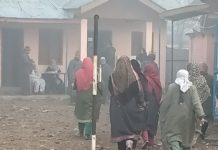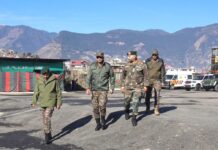Peshawar, June 27: In more bad news for Shehbaz Sharif, the Pakistan Tehreek-e-Insaf sponsored “tribal peace jirga” has vehemently opposed the federal government’s move to launch ‘Azm-i-Istehkam’ and said the anti-terrorism operation was a ploy to take over the minerals in the Pakhtun belt.
The jirga in Khyber-Pakhtunkhwa province also passed a resolution demanding the release of PTI’s incarcerated leader, former Prime Minister Imran Khan.
The meeting was attended by leaders and dignitaries from the tribes of the province as well as provincial and federal governments of the PTI
Addressing the jirga, K-P Information Adviser Barrister Saif made it clear that the people would never allow such an operation to be launched on their land until they and their elected representatives were taken on board.
“We have been suffering the consequences from 1979 until now,” he said.
Saif added that any decision made without taking parliamentary consent, or the provincial government and the people into confidence would be “unconstitutional” and “undemocratic”.
The jirga further insisted on removing the trade barriers with Afghanistan, start negotiations with the Afghan government and reopen the routes, demanding the creation of a “Pak-Afghan economic corridor policy and facilitation of bilateral business by the Federal Board of Revenue.”
It further demanded the immediate fulfilment of all promises made by the government to the tribal people and said all those who had suffered a lot in the war on terrorism should be properly compensated.
“This jirga condemns the ongoing illegal and unconstitutional measures and violation of human rights in the country. Also, all political prisoners, including PTI founder Imran Khan, should be released forthwith and all cases registered against them should be withdrawn,” it said in the resolution.
Meanwhile, Maulana Fazlur Rehman, the chief of Jamiat Ulema-e-Islam (JUI-F), has also rejected the government’s decision to launch the anti-terror operation.
He condemned the violations of tribal sanctity and economic destruction, adding that fencing had forced 20,000 to 30,000 people to cross the border and return more powerful.








